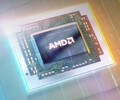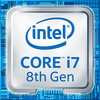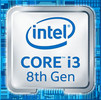AMD A9-9410 vs Intel Core i7-8650U vs Intel Core i3-8130U
AMD A9-9410
► remove from comparison
The AMD A9-9410 is an entry-level chip from the Stoney-Ridge APU series for notebooks (7th APU generation), which was announced mid 2016. At its launch, the A9-9410 is the fastest Stoney Ridge processor (dual-core version of Bristol Ridge) and integrates two CPU cores (one Excavator module with 2 integer and on FP unit) clocked between 2.9-3.5 GHz. It also includes a Radeon R5 GPU with 192 shaders at 800 MHz as well as a single-channel DDR4-2133 memory controller, H.265 video engine and chipset with all I/O ports.
Architecture
Stoney Ridge is the successor of the Carrizo architecture and the design is almost identical. Thanks to optimized manufacturing processes and more aggressive Boost behavior, however, the clocks are a bit higher at the same power consumption. The memory controller now also supports DDR4-RAM, in this case up to 2133 MHz. Stoney Ridge is the designation for the smaller dual-core and single-core chip, while Bristol Ridge is the bigger quad-core chip with dual-channel memory controller. More technical details are available in the following articles:
Performance
Thanks to the high maximum clock of up to 3.5 GHz, the single-core performance should be pretty good. The multi-core performance on the other hand is much lower compared to the Bristol Ridge models. Compared to older Carrizo-L/Beema quad-cores, the APU should still perform pretty well. The level of performance should be similar to a Core-m3 and therefore also be sufficient for more demanding applications.
The TDP can be configured between 10-25 Watts, so there can be big performance differences under sustained workloads.
Graphics Card
The integrated Radeon R5 (Stoney Ridge) GPU has 192 active shader units (3 compute cores) clocked at up to 800 MHz. More details about the GPU are available in the linked articles above.
Power Consumption
AMD specifies the TDP of the A9-9410 with 15 Watts, but it can be configured between 10-25 Watts. This means the CPU is a good choice for thin and light notebooks, but also 15-inch devices with better cooling capabilities.
Intel Core i7-8650U
► remove from comparison
The Intel Core i7-8650U is a power efficient quad-core SoC for notebooks and Ultrabooks based on the Kaby Lake Refresh generation and was announced in August 2017. Contrary to its direct predecessor the Core i7-7600U, which were still dual-cores, the i7-8650U is equipped with four cores but at a lower base frequency of 1.9 GHz. The Turbo Boost can go up to 4,2 GHz and therefore also offer good short term single core speeds. The GPU is now named Intel UHD Graphics 620 but otherwise identical to the Intel HD Graphics 620. The integrated memory controller supports DDR4-2400 / LPDDR3-2133 and dual channel memory.
Architecture
Intel basically uses the same micro architecture compared to Skylake, so the per-MHz performance does not differ. The manufacturer only reworked the Speed Shift technology for faster dynamic adjustments of voltages and clocks, and the improved 14nm process allows much higher frequencies combined with better efficiency than before.
Performance
According to Intel, the new quad core models are up to 40% faster than their dual core predecessors. Due to the reduced TDP and the same 14nm+ process, the long term performance and throttling behaviour will be interesting and depending on the laptop design. Therefore, the older 35 Watt quad-core models should be faster in applications that demand longer CPU loads. The performance however is highly depending on the TDP settings and cooling solution of the laptop. Especially, longer loads will show varying results in different laptops.
Graphics
The integrated Intel UHD Graphics 620 (Intel Gen 9.5) is untouched from the 8th Gen Kaby Lake chips. With fast dual-channel memory it can reach the performance of a dedicated GeForce 920M.
Contrary to Skylake, Kaby lake now also supports H.265/HEVC Main 10 with a 10-bit color depth as well as Google's VP9 codec. The dual-core Kaby Lake processors announced in January should also support HDCP 2.2.
Power Consumption
The chip is manufactured in an improved 14nm process with FinFET transistors (14nm+), the same as the 7th Gen Kaby Lake processors. Intel still specifies the TDP with 15 Watts, which is typical for ULV chips. Depending on the usage scenario, the TDP can vary between 7.5 (cTDP Down) and 25 Watts.
Intel Core i3-8130U
► remove from comparison
The Intel Core i3-8130U is a power efficient dual-core SoC for notebooks and Ultrabooks (most likely) based on the Kaby Lake Refresh generation (and not Coffee Lake). It was announced in February 2018. Compared to its direct predecessor, the Core i3-7130U, the 8130U offers Turbo Boost for an increased single thread performance. The GPU is now named Intel UHD Graphics 620 but otherwise identical to the Intel HD Graphics 620. The integrated memory controller supports DDR4-2400 / LPDDR3-2133 and dual channel memory.
Architecture
Intel basically uses the same micro architecture compared to Skylake, so the per-MHz performance does not differ. The manufacturer only reworked the Speed Shift technology for faster dynamic adjustments of voltages and clocks, and the improved 14nm process allows much higher frequencies combined with better efficiency than before.
Performance
Clocked at 2.2 to 3.4 GHz, the Core i3-8130U offers a much better single core performance than the Core i3-7130U (2.7 GHz, no Turbo). Therefore, the overall performance should be comparable to the older Core i5-7260U (also 2.2 - 3.4 GHz). The Core i5-8250U offers four processor cores and therefore offers a much better multi-threaded performance.
Graphics
The integrated Intel UHD Graphics 620 (Intel Gen 9.5) is untouched from the 8th Gen Kaby Lake chips. In the Core i3-8130U it is rather low clocked with 1 GHz compared to the 1.1 GHz in Core i7 models. With fast dual-channel memory it can reach the performance of a dedicated GeForce 920M.
Contrary to Skylake, Kaby lake now also supports H.265/HEVC Main 10 with a 10-bit color depth as well as Google's VP9 codec. The dual-core Kaby Lake processors announced in January should also support HDCP 2.2.
Power Consumption
The chip is most likely manufactured in an improved 14nm process with FinFET transistors (14nm+), the same as the 7th Gen Kaby Lake processors. Intel still specifies the TDP with 15 Watts, which is typical for ULV chips. According to Intel it can be configured to 10 Watt at 800 MHz (cTDP-down).
| Model | AMD A9-9410 | Intel Core i7-8650U | Intel Core i3-8130U | ||||||||||||||||||||||||||||||||||||||||||||||||||||||||||||||||||||||||||||||||||||||||||||||||||||
| Series | AMD Bristol Ridge | Intel Kaby Lake Refresh | Intel Kaby Lake Refresh | ||||||||||||||||||||||||||||||||||||||||||||||||||||||||||||||||||||||||||||||||||||||||||||||||||||
| Codename | Stoney Ridge | Kaby Lake Refresh | Kaby Lake Refresh | ||||||||||||||||||||||||||||||||||||||||||||||||||||||||||||||||||||||||||||||||||||||||||||||||||||
| Series: Kaby Lake Refresh Kaby Lake Refresh |
|
|
| ||||||||||||||||||||||||||||||||||||||||||||||||||||||||||||||||||||||||||||||||||||||||||||||||||||
| Clock | 2900 - 3500 MHz | 1900 - 4200 MHz | 2200 - 3400 MHz | ||||||||||||||||||||||||||||||||||||||||||||||||||||||||||||||||||||||||||||||||||||||||||||||||||||
| L2 Cache | 1 MB | 1 MB | 1 MB | ||||||||||||||||||||||||||||||||||||||||||||||||||||||||||||||||||||||||||||||||||||||||||||||||||||
| Cores / Threads | 2 / 2 | 4 / 8 | 2 / 4 | ||||||||||||||||||||||||||||||||||||||||||||||||||||||||||||||||||||||||||||||||||||||||||||||||||||
| TDP | 10-25 Watt | 15 Watt | 15 Watt | ||||||||||||||||||||||||||||||||||||||||||||||||||||||||||||||||||||||||||||||||||||||||||||||||||||
| Transistors | 1200 Million | ||||||||||||||||||||||||||||||||||||||||||||||||||||||||||||||||||||||||||||||||||||||||||||||||||||||
| Technology | 28 nm | 14 nm | 14 nm | ||||||||||||||||||||||||||||||||||||||||||||||||||||||||||||||||||||||||||||||||||||||||||||||||||||
| Die Size | 124.5 mm2 | ||||||||||||||||||||||||||||||||||||||||||||||||||||||||||||||||||||||||||||||||||||||||||||||||||||||
| max. Temp. | 90 °C | ||||||||||||||||||||||||||||||||||||||||||||||||||||||||||||||||||||||||||||||||||||||||||||||||||||||
| Socket | BGA | BGA1356 | BGA1356 | ||||||||||||||||||||||||||||||||||||||||||||||||||||||||||||||||||||||||||||||||||||||||||||||||||||
| Features | Single-Channel DDR4-2133, Virtualization, | Dual-Channel DDR4 Memory Controller, HyperThreading, AVX, AVX2, Quick Sync, Virtualization, AES-NI | Dual-Channel DDR4/LPDDR3 Memory Controller, HyperThreading | ||||||||||||||||||||||||||||||||||||||||||||||||||||||||||||||||||||||||||||||||||||||||||||||||||||
| iGPU | AMD Radeon R5 (Stoney Ridge) ( - 800 MHz) | Intel UHD Graphics 620 (300 - 1150 MHz) | Intel UHD Graphics 620 (300 - 1000 MHz) | ||||||||||||||||||||||||||||||||||||||||||||||||||||||||||||||||||||||||||||||||||||||||||||||||||||
| Architecture | x86 | x86 | x86 | ||||||||||||||||||||||||||||||||||||||||||||||||||||||||||||||||||||||||||||||||||||||||||||||||||||
| Announced | |||||||||||||||||||||||||||||||||||||||||||||||||||||||||||||||||||||||||||||||||||||||||||||||||||||||
| Manufacturer | products.amd.com | ark.intel.com | ark.intel.com | ||||||||||||||||||||||||||||||||||||||||||||||||||||||||||||||||||||||||||||||||||||||||||||||||||||
| L1 Cache | 256 KB | 256 KB | |||||||||||||||||||||||||||||||||||||||||||||||||||||||||||||||||||||||||||||||||||||||||||||||||||||
| L3 Cache | 8 MB | 4 MB | |||||||||||||||||||||||||||||||||||||||||||||||||||||||||||||||||||||||||||||||||||||||||||||||||||||
| $409 U.S. |


 Deutsch
Deutsch English
English Español
Español Français
Français Italiano
Italiano Nederlands
Nederlands Polski
Polski Português
Português Русский
Русский Türkçe
Türkçe Svenska
Svenska Chinese
Chinese Magyar
Magyar
